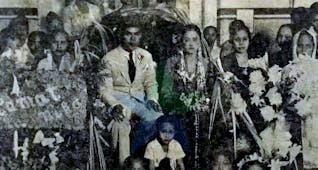- by Wibawanto Nugroho*
The recent court trial of indicted individuals in the corruption case of electronic ID card system in Indonesia has mentioned the alleged involvement of various key stakeholders in Indonesian political leadership. Although the mentioning of these names does not mean that these names are guilty (based on the presumption of innocence), it however has mind blown the nation that subsequently compels the three main branches of Indonesian government: the legislative; the judicative; and the executive to further investigate and settle the case on the basis of establishing the “good life” characterized by justice and well being of all Indonesian citizens. Achieving the “good life” of citizens is the foundation for achieving the prosperous and strong nation, and without that it is impossible for the society to progress and for the national purposes to be achieved.
In the Republic, Plato expressed his disillusionment and little sympathy of democracy following the death sentence of his inquisitive teacher, Socrates during the Athenian democratic system that involved city states/polis in the ancient Greece. For Plato who believed in the eternity of human soul that belongs to the “Higher Realm,” that currently occupy the temporary physical body of human being, the ideal forms must be placed above all other physical-minded and pragmatic goals. Precisely, Plato argued that the state of any form of government has its potentiality to become “evils” because the political leadership fails to practically place wisdom, ethics, and morality (the eternal values) on the top of everything. In the later years, this Platonic philosophy was greatly adopted into the Judeo-Christian values and Islamic cultures that subsequently shaped the advancement of Western civilization (from the 4th until 21st century) including the “golden age of Islam” under the Abbasid Caliphate (from the 8th century) that established its “House of Wisdom” under the Caliph Harun al-Rashid.
We cannot fully understand the meaning of “evils” within this context without understanding the concept of eudemonia, the “good life” that for ancient Greeks was a vital aim for every individual, society, and state to achieve. “Living well” in this sense was not a question of achieving material well-being, honor, or mere pleasure, but rather living according to fundamental virtues such as wisdom, piety, and above all, justice. For Plato, the purpose of the state was to promote these virtues so that its citizens could lead this “good life.” That said, issues such as protection of property, liberty, and stability were only important in so far as they were able to create conditions that allowed citizens to live well. No political system according to Plato had yet existed that fulfilled this objective, thus the defects within them encouraged what he saw as “evils,” or the opposite of these virtues. Plato reasoned that is that rulers, whether in a monarchy, oligarchy, or democracy, tend to rule in their own interests rather than to rule for the good of the state and its people.
Plato explained that this problem was due to a general ignorance of the virtues that constituted the “good life,” which in turn leads people to desire the wrong values/things, especially the transitory pleasures of honor and wealth at the cost of citizens’ “good life.” This is an intolerable condition for Plato, and indeed these prizes come with political power, and the problem is even intensified in the political arena involving the few political elites that according to Plato should exercise the example of morality and ethics instead of being unmorally and unethically seeking their political power to advance their own agendas that are framed in such a way in order to be deceptively seen as for creating the “good life” for the society. This is extremely important since according to Plato’s teacher, Socrates, political society exists for the sake of noble actions, and not of mere companionship. Therefore, the desire to rule, for what Plato saw as the wrong reasons by politicians, leads to conflict among citizens. With everyone seeking increased power (e.g. through unethical and unmoral ways), this ultimately undermines the stability and unity of the state. Whoever emerges victoriously from this game of power struggle will deprive their opponents of the power to achieve their desires, that subsequently leads to injustice, which is defined by Plato as an evil that is diametrically contrary to the cornerstone of Plato’s notion of the “good life.”
So, what is the solution for this problem? Actually Plato shared with Confucius of who should lead the nation and rule the society through state’s government. Both Confucius and Plato strongly believed that a leader (e.g. political leadership in the today’s context of Indonesian democracy) must be the “superior men” or a “junzi” (for Confucius) and “a philosopher kings” (for Plato) who have at least two characteristics.
First, they are the ones who understand the meaning of the “good life” in the strictest sense and alone recognize the worth of virtues above the pleasures of honor and money, and they have devoted their lives to the pursuit of the “good life.” Because of this, they do not lust after fame and fortune, and so have no desire for political power. In the today’s context of Indonesian democracy, these individuals could come from any background either intellectuals, businessmen, bureaucrats, or any able citizens (based on the meritocracy) that are worthy to lead the nation through its democratic system as long as they fulfill such criteria. Using the Plato’s logic, these individuals should not rule the nation by their own personal ambition, but due to their “divine calls” to lead the nation by the means of virtue and giving good example.
Second, as these individuals possess what according to Confucius as the qualities of virtue, faithfulness and sincerity, and what according to Plato as the consistent pursuer of wisdom and knowledge, their real-life example of living the virtuous life is able to change the people and eventually the overall society and the nation. Both Plato and Confucius believed that a wise and just sovereign had a benign effect on the character of his/her subjects. Where the ruler sets an example of high virtue for his subjects, his/her policies and ideas will be dispersed through his/her ministers/advisors, that transcends his/her people/citizens who begin to emulate the ruler’s goodness. For Plato and Confucius, the maxim of leadership is very simple. If a leader’s desire is for good, the people will be good. That is why, based on this fundamental values Confucius whose teachings greatly influences Maoist-Marxism and today’s mixed economy of China put the strictest adherence to the rule of law in punishing and removing any leaders/rulers, ministers and advisors, as well as the citizens who fail to meet the standard of virtue, faithfulness, and sincerity. For Confucius, anyone in the society who fails to meet these standards at the same time they are violating the fundamental values of loyalty, duty, and respect, thus corrupting the society both in the short and long-run.
Having laid out the meaning of the virtue in the Platonic and Confucian thinking, it is not wondering of why the Greek and Chinese culture has become so much influential in the human civilization. Even much older than Plato and Confucius, one of the greatest kings ever lived in this world and acknowledged by the Judaism, Christianity, and Islam: the King Solomon (1010 BC - 931 BC) was considered the wisest and wealthiest King ever lived. Under his leadership, his Israeli kingdom was becoming the world’s wealthiest and magnet of the world’s attention including by its potential contenders: the kingdom of Egypt, of Assyrian, of Babylon, of Persia, and later by the Greece under Alexander the Great and the Rome (as the origin of Roman Empire and wider Western civilization). The key of the King Solomon is very simple. The Abhamic religions record that when the King Solomon was confronted and asked by God the almighty, the King Solomon was only asking for the wisdom. Once he only asks God for the wisdom, God knows that this is the right attitude. Consequently, the King Solomon was given everything else that follows: the prosperity, fame, and richness for himself and his kingdom.
Therefore, it is within the same logic if Indonesia as a nation wants to become big and strong. Indonesia must be led, ruled, managed, and administered by the wise and virtuous political leaders that are sustained by loyal, enlightened and critical society who are intolerable to the “defects” in the society that corrupts the nation both in the short and long-run. Indonesia as a state just existed in the 20th century, and thus it is much easier for us if we want to make this nation great. We can just observe, and no need to experiment by trial-and-error, from the success story of older influential civilizations. The simple maxim is still same, when a leader and nation aims and practice for the ideal, virtuous aims, all others will follow. This is indeed quite contrary to the “Proxy War” theory that views the outside world as the potential destroyer of Indonesia. The greatest potential destroyer of Indonesia is not the outside world, but our own selves that fail to act virtuously and ignore the potential defects corrupting this nation. In line with the concern of Plato’s admirers in the later years such as Augustine the Hippo, Abu Nasr al-Farabi, and Thomas Aquinas among many others, the ultimate goal of the model state is not merely about a temporal material prosperity, but also their future destiny.
*The writer is an Alumni Fellow with the U.S. National Defense University in Washington, D.C., Indonesian Fulbright scholar and a Ph.D. candidate with the University of Exeter, in U.K.
Sumber foto: https://static.republika.co.id/uploads/images/inpicture_slide/presiden-joko-widodo-memberi-hormat-ketika-lagu-indonesia-_150806191502-862.jpg
Cek berita, artikel, dan konten yang lain di Google News














